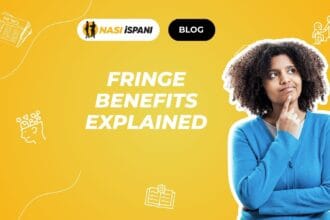Fringe benefits are non-cash perks provided by employers in addition to the base salary. These benefits enhance an employee’s total compensation and can significantly impact their overall lifestyle. For job seekers and employees in South Africa, understanding these benefits is crucial, as they can boost job satisfaction, increase savings, and improve work-life balance.
What Are Fringe Benefits?
Fringe benefits are extras that employers provide beyond the regular salary or wages. These can be cash or non-cash perks that enhance the compensation package. While benefits, perks, and allowances may be used interchangeably, there are differences:
- Benefits: Non-cash perks like health insurance, pensions, or company cars.
- Perks: Non-monetary additions like gym memberships or free meals.
- Allowances: Cash or reimbursements, such as car allowances or meal allowances.
Companies offer these benefits to retain employees, provide tax advantages, and enhance overall productivity.
Common Fringe Benefits in South Africa
Car Allowances & Company Vehicles
- Car Allowances: Employers may offer a cash allowance to cover vehicle-related expenses or provide a company car for business and personal use.
- Tax Implications: The use of a company car is a taxable benefit in South Africa, calculated as a percentage of the car’s value. A car allowance is generally taxed as income.
- Who Qualifies: Employees in roles like sales, executives, or field staff typically qualify for car-related benefits.
Performance Bonuses
- Definition: Bonuses awarded based on meeting or exceeding performance targets, often paid annually or quarterly.
- Tax Implications: Performance bonuses are taxable as part of regular income.
- Key Industries: Finance, sales, and corporate management sectors often offer these bonuses.
Medical Aid & Health Benefits
- Employer Contributions: Many employers contribute to employees’ medical aid schemes, reducing the cost for employees.
- Wellness Programs: Some employers offer wellness programs, such as gym memberships or mental health support.
Pension / Retirement Contributions
- Employer Contributions: Employers often contribute to a pension or retirement fund, helping employees save for retirement.
- Importance: This benefit ensures long-term financial security.
Housing & Accommodation Allowances
- Rental Subsidies: Employers may provide rental assistance or company-provided accommodation.
- Tax Implications: These allowances are taxable, and the amount depends on the value of the housing or subsidy.
Travel & Meal Allowances
- Travel Allowances: Reimbursement for business-related travel expenses.
- Meal Allowances: Some employers provide daily meal allowances or reimbursements for meals during work-related travel.
- Tax Implications: Any excess allowance beyond SARS thresholds is taxable.
Education & Professional Development
- Tuition Reimbursement: Employers may reimburse employees for education expenses or support further professional development.
- Benefits: This enhances career growth and employability.
Other Popular Perks
- Stock Options: Employees may be granted shares in the company.
- Gym Memberships: Some companies provide access to gyms or wellness programs.
- Flexible Work Arrangements: Options like remote work, flexible hours, or extra leave.
- Company Gadgets: Employers may provide work-related tools such as smartphones, laptops, or tablets.
How Fringe Benefits Affect Your Total Compensation
Fringe benefits play an essential role in calculating total remuneration. To illustrate, a salary of R30,000/month might be considered alongside a R25,000 salary with added perks such as medical aid, a car allowance, and performance bonuses. The total value of the benefits could significantly outweigh the base salary.
Negotiating Benefits: It’s important for employees to understand the full value of their compensation and negotiate benefits that suit their needs, ensuring a well-rounded and lucrative package.
Tax Considerations for Fringe Benefits in South Africa
Not all fringe benefits are taxed the same way in South Africa. Some benefits, such as medical aid contributions, may be tax-free, while others, like car allowances and performance bonuses, are taxable.
Tax Reporting: Employees must report their fringe benefits accurately on their tax returns to ensure they comply with SARS regulations.
Optimizing Tax-Efficient Packages: To maximize the value of benefits, consider negotiating for benefits that are tax-free or taxed at a lower rate.
Negotiating Fringe Benefits
When evaluating job offers or salary negotiations, employees should assess what matters most to them—whether it’s cash benefits like a higher salary or non-cash perks like medical aid, flexible work options, or housing allowances.
Examples of High-Impact Benefits to Request:
- Medical aid
- Performance bonuses
- Car allowance
- Professional development funding
Check also: How to Answer the Salary Expectation Question During an Interview in 2025
Fringe benefits are an important part of compensation, often offering more value than the base salary. Job seekers and employees should carefully review their offers, understanding how fringe benefits can boost both earnings and lifestyle. Take charge of your compensation package to ensure you’re maximizing both salary and benefits.
Related resources: Latest Job Opportunities | Internships in South Africa | Learnership Opportunities




